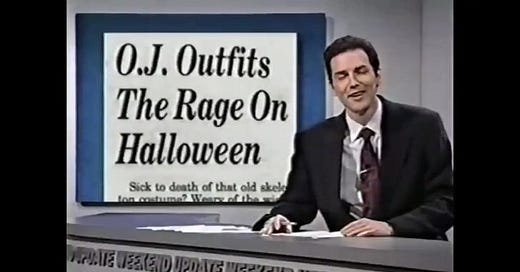Welcome to Just Two Things, which I try to publish daily, five days a week. It’s on a slightly reduced schedule while I’m away. Some links may also appear on my blog from time to time. Links to the main articles are in cross-heads as well as the story.
#1: Remembering Norman Macdonald
A note here to mark the death of the comedian Norm Macdonald at the early age of 61 from cancer.
Macdonald made his reputation as the host of Saturday Night Live’s Weekend Update in the 1990s, and there are different versions about why he left the show after three years.
One is that he continued to make jokes about the O.J.Simpson murder case on the slot, which—by his account—didn’t go down well with the NBC President, who was a friend of Simpson’s.

The official line after he’d left was that he’d stopped being funny, which Macdonald skewered when he was invited back to host the show eighteen months later:

Either way, he managed in a lot of his work to skate along the edge of danger. (He was also an inveterate gambler, where he also lived on the edge, sometimes catastrophically). But he was also able to make old and tired jokes seem completely fresh, as on this clip on the Tonight show. Conan O’Brien is the host.
If you want to know more, the Rolling Stone obituary seems like a good place to start.
(Thanks to Peter Curry for his help on this).
#2: The shorter working week is coming
I’ve written about the shorter working week several times here, and there’s a short podcast (15 minutes) on the Australian ABC podcast The Signal on this topic featuring Juliet Schor, the American academic who specialises in the study of work.
Generally, the model proposed is less hours but for the same pay, and she covers the familiar ground crisply, such as the number of countries conducting trials (Ireland needs to be added to the list) and the typical effects—productivity tends to increase to cover the reduced hours.
She makes an interesting exception to this. In some trials involving care work, shift lengths were reduced from eight hours to six hours. The quality of the care went up, and staff were less burnt out by the work (I’m guessing these two facts might be related), but extra people had to be taken on to cover the ‘missing’ hours.
I suspect that this may still produce financial benefits for the employer, since sickness likely fell along with staff turnover, although this is not explicitly said on the podcast. But there’s a broader point here: that ‘productivity’ isn’t the only thing worth measuring when it comes to work.
Schor was asked if the shorter working week is a blip or a trend. She suggests that it is a trend, for two reasons. The first is that the pandemic has disrupted our expectations of the relationship between our family lives and social relationships, and our working lives (I’d add that this relationship was already being challenged beforehand).
The second is that the trend on reducing working hours is a 150-year trend, depending on which country you look at. The years since the 1980s, when this trend flattened out, at least in some countries such as the US, were the exception.
j2t#168
If you are enjoying Just Two Things, please do send it on to a friend or colleague.



